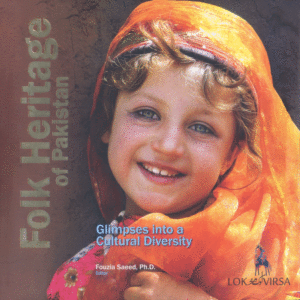Book Review: Folk Heritage of Pakistan
By Afsheen Ahmed | Published 7 years ago

“The Pluralistic Face of Pakistan’ is the title of the first chapter that basically sums up the latest book – Folk Heritage of Pakistan: Glimpses into Cultural Diversity – launched by The National Institute of Traditional and Folk Heritage, more popularly known as Lok Virsa, Islamabad.
A coffee-table sized book, with nearly 500 beautifully captured images, it is an anthology of articles written by four scholars – Kamran Ahmad, Sarwat Ali, Talha Ali Kushvaha and Samar Majid – edited by the well known women’s rights campaigner and, till recently, executive director of the Lok Virsa, Dr. Fouzia Saeed. An anthropologist, Fouzia has written two books previously, Working with Sharks and Taboo, on the controversial themes of sexual harassment and sex workers.
The current book, divided into nine chapters, tries to give an overview of Pakistan’s vibrant culture and society, while lamenting that the image of the country has been “reduced to the imperatives of a 24-hour news cycle… of a troubled country besieged by militancy and a chaotic political landscape.” It is an impassioned attempt, in print and images, to counter that negative image, and is targeted primarily at a western audience.
From ‘Historical Landscapes’ to the ‘Folk Crafts, Music, Dance, Festivals and Entertainment of Pakistan,’ with elaborate details about each, to ‘Sufism: The Lived Spirituality in Everyday Life,’ the book ends satisfyingly, having made an irrefutable argument about ‘Diversity in Pakistani Society.’
Fouzia Saeed sets the tone by categorically stating that “Pakistan (despite rapid globalisation) has retained its indigenous aesthetics…and not (been) engulfed by the homogenous T-Shirt culture of the western world.” She states that there has also been something of a backlash; post-Partition, the focus was to “build a nation out of a diverse people” and so the emphasis was on focusing on the similarities and glossing over the differences. The tide has now turned as the new generation is becoming more appreciative of the enormous cultural diversity that exists in different regions of the country.
Somewhat surprisingly, in a book about folk heritage, the Sufi section, sub-divided under different headings, is very detailed, particularly the one titled ‘Ishq: Love and Heart-Matters.’ It talks about people who, while not observing the outward forms of religion, nonetheless “perform good deeds for others,” but this terrifies those “who are fixated on the form only and (not) the spirit behind the form.” And goes on to say that Sufism is very emphatic on this issue: “Ishq-i-Majazi, worldly love, can open one up to Ishq-i-Haqiqi, the divine love.” Which, in turn, “leads to a life selflessly lived with a connection to the whole. This is spirituality in its purest form.”
The book covers a vast canvas, supported by photographs. The images, though beautiful in themselves, are not all uniformly creative. There are many shots which would have been far more powerful if captured from a different angle, offering more depth, more clarity. However, the book itself has broadly met its objective: “The need to highlight what the real Pakistan is, with its deep roots in historical layers of civilisation over ten thousand years, its diverse ethnicity and its rich cultural present.”


